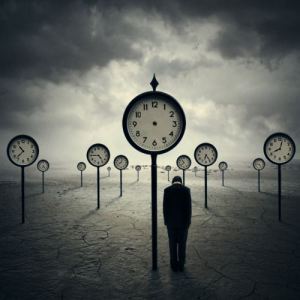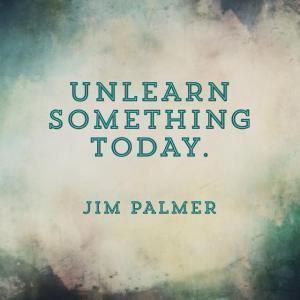Jim Palmer's Blog, page 27
July 25, 2014
The fallacy of “generational sin” (as God’s punishment)
I was reading about the Christian concept of “generational sin” this morning because of a question I received on FB. One of the statements I read about it said, “The sins of the fathers are punished in the children through becoming the sins of the children.” The idea that God punishes the “sins” of parents by cursing the children ranks right up there with one of those most absurd things I have ever heard. The plain and simple truth is that every human being is a product of their conditions until they begin to exercise conscious choice, and even then it often requires substantial personal work to free oneself from destructive patterns that a person has been conditioned into. In other words, we all are predisposed to the dysfunctions of the family unit and early life circumstances we grew up in. It’s often the case that we perpetuate these by default until we guide our lives more consciously, and choose differently. God has nothing to do with it. God is not actively punishing people by somehow cursing their children.


July 22, 2014
On being alive
Alan Wilson Watts wrote, “The meaning of life is just to be alive. It is so plain and so obvious and so simple. And yet, everybody rushes around in a great panic as if it were necessary to achieve something beyond themselves.” We have difficulty comprehending and accepting these words, which is symptomatic of our woefully inadequate view of what life is.
Religion often doesn’t help the matter by focusing out attention on the afterlife, and more or less implying that attachment to the herelife is “worldly,” “ungodly,” and “sinful.” Religion’s apocalyptic view of the world’s end reinforces this further. Why bother if it’s all going up in smoke and flames anyway?
I find it interesting that Christianity puts tremendous emphasis on the birth of Jesus and his death/resurrection, and misses what happened in between… umm… like… his life! Joseph Campbell said, “We save the world by being alive ourselves.” We think of Jesus’ death/resurrection as the salvific part and forget that Jesus was saving the world all along by being alive himself, and showing us what this meant.
Howard Thurman wrote, “Don’t ask yourself what the world needs, ask yourself what makes you come alive, and then go and do that. Because what the world needs is people who have come alive.”


July 19, 2014
Stop trying to be free
“Jim, how do I become free?”
I am asked the above question a lot. I’ve never given the same answer twice because the context, specifics, and person asking are always different. This morning, a few things particularly came to mind about this question.
“Jim, how do I become free?”
1. Realize you ARE free.
You don’t “become” free. You ARE free. Your fundamental, underlying, unchanging Self is one with God. That Self is whole, free, at peace, and well. That Self is in no need of improvement or enlightenment, and has nothing to gain, earn, attain or become. That Self is never threatened. So, no person needs to “become” free. What we’re talking about is how to stretch out into and walk in the freedom that you already have and are.
2. Stop seeking freedom.
We have made “freedom” into a concept and category with which we have become obsessed. We see the world through eyes of dualism: up/down; right/left; day/night; happy/sad; free/not free. We inflate this concept we call “freedom,” give it a life of its own, and incessantly judge ourselves by it. Think of the flower pedals and the inner dialogue: “He, loves me; he loves me not. He loves me; he loves me not, etc…” In the same way, we say to ourselves: “I am free; I am not free. I am free; I am not free, etc…” Don’t become attached to the idea of “freedom.” Don’t seek it as an outcome. Stop incessantly analyzing your life and whether are not you are “free” and how much.
3. Do what connects you with your true Self.
What stimulates and stirs your awareness of who you are beyond your human mind and body? What opens up for you the direct and unmediated awareness and experience of the way things really are as whole and one? What connects you with the awareness of the infinitude and eternality of who you are and all things? What enables you to sink down into and center yourself into the harmony and wellness of all things?
4. Respond as the situations of your life require.
Sometimes people are trying to work out unhappiness in their lives through spirituality, when the situation requires them to work it out by doing their personal human work. If you are suffering in life because of depression, codependency, addiction, stress, self-sabotaging thoughts or behaviors, relationship struggles, health issues… then it is necessary to address these accordingly, which will likely include things like therapy, professional mental health services, support groups, counseling, support network, personal diligence, etc. There is no substitute for this. No amount of “spirituality” can excuse one of the need to do their personal work to address these kinds of issues. In many cases, people are not experiencing “freedom” in their life because they are not doing their personal work.
5. Create a daily intention that resonates with and inspires you.
Quit fretting over whether you are free in your life. Start setting daily intentions that direct your path. Maybe on Monday, you decide you want to approach life from a place of acceptance rather than judgment, including self-acceptance. Perhaps on Thursday, you establish as an intention to be courageously authentic. What way of being resonates with you? What life or self affirmation inspires you?
6. Ask a new question.
Rather than asking, “How can I be free?” ask these kinds of questions:
What makes you come alive?
What satisfies you most deeply?
What fills you up?
What brings you joy?
What centers you?
What is a source of delight and pleasure for you?
What areas, fields, or subjects are you interested in exploring?
What makes you feel connected to yourself?
What forms of self-expression are the most gratifying?
What would your sense of adventure tell you to do?
What way of being in the world resonates most deeply with your heart?
Where does your sense of curiosity take you?
How are you most compelled to aid the liberation of others?
Where in life are you inspired to be a tangible expression of love, acceptance, and compassion?
What nurtures a greater love for yourself and others?


July 18, 2014
That reality moving through our universe
As human beings we experience the world through the prism of our five limited physical senses. Our eyes can only see what is called “visible light,” which is light between infrared light and ultraviolet light. There is light bouncing around everywhere but we cannot see it. Our ears can only hear a tiny decibel range. Humans cannot hear a dog whistle, because it emits sound in the ultrasonic range, which people cannot hear. We cannot hear high-pitch frequency sounds.
Isn’t it likely then that there are other vibrations, frequencies, energies, consciousness moving through the universe?
The central message of Jesus was that the Kingdom of God has come. People scratched their heads because they could not locate, access or find evidence of this Kingdom. But Jesus insisted, “The Kingdom of God is among you.” He told people to look inside themselves to find it.
The Kingdom of God is present in every moment but it is amorphous, without shape or form. You cannot point to it and say, “There it is.” The reality of God’s kingdom is unlimited, its space is infinite, its time is eternal. We allow this reality to be limited by our senses and prescribed by our senses. We confine our experience of the world through these five apertures into our reality.
The Kingdom of God is moving through this universe in every moment. It is the fundamental essence of who you are. We are the Kingdom of God. This expansive and amorphous reality is known or experienced as something we would use words like love, peace, harmony, whole, beautiful, and one to describe.
The adventure, fulfillment, and purpose of our human existence is to give birth to this reality, this kingdom in the time and space dimension of human living. You must first know and touch this reality in and as yourself, and become aware of its unlimited, infinite, eternal, and ever-present nature. Like a well-tuned guitar or piano, your spirit is in tune or harmonized with the reality of God’s kingdom, and your daily life becomes a human expression of it. You birth the Kingdom of God into the world along the everyday paths of life through your thoughts, intentions, actions, encounters, relationships, creations, responses, and your way of seeing and being in the world.


July 14, 2014
Aiding the liberation of humankind and all living things
What follows are 8 reflections I’ve written about taking on new ways of being in our world for the liberation of all…
Be irreverent (and other ways to change the world)
20 really good ideas whatever you happen to believe about God
You can’t change anything without liberty, equality, and solidarity


Be irreverent (and other ways to change the world)
8 ways of being to create a new future for our world:
1. Curiosity
the desire to learn or know more about something; inquisitive interest; interest leading to inquiry
2. Irreverence
the willingness to question an individual, idea, dogma, organization, institution, etc., considered to be exempt from criticism or questioning;
3. Imagination
the act or power of envisioning a possibility not yet present or wholly perceived in reality
4. Sense of humor
the tendency to provoke laughter and provide amusement; the mental faculty of discovering, expressing, or appreciating ludicrous or
absurdly incongruous elements in ideas, situations, happenings, or acts; a way to maintain one’s sanity on the journey
5. Ego
unreserved confidence in one’s ability and power to do what he or she believes must be done;
6. A free and open mind
has no need for the security of an ideology; does not create a new religion or pour concrete over his or her latest discovery; willing to consider new and different ideas and views
7. Acceptance
starting with the reality of the way things really are – the condition and suffering of our individual lives, and the condition and suffering of all humankind and living things; taking responsibility and ownership of our lives and the world we have created
8. Love
living in solidarity and compassion with all humankind and living things; seeking to do no harm against another; working towards the well-being of all, and building a world that works for everyone


July 13, 2014
Power is not bad
The English work “power” comes from the Latin word “posse,” which became “poeir” in french, and then “power” in English. The word means to “be able.” It’s the ability, whether physical, mental, moral or spiritual, to act. The word “power” gets a bad wrap The first thing that comes to mind for most people is Lord Acton’s quote, “Power corrupts, and absolute power corrupts absolutely.” That’s not even what he said. A very important word got left out. The proper quote is, “Power TENDS to corrupt, and absolute power corrupts absolutely.” The corruption of power is not in power, but in ourselves.
Power is the very essence, the dynamo of life. It is the power of the heart pumping blood and sustaining life in the body. Power is the organizing energy of human beings, pulsing upward, providing a unified strength for a common purpose and vision. Power is an essential life force always in operation, either changing the world or opposing change.
The power of the human mind can create humankind’s most glorious
achievements, and develop perspectives and insights into the nature of
life-opening horizons previously beyond the imagination. The power of the human mind can also devise philosophies and ways of life that threaten and destroy the future of humankind. Either way, power is the dynamo of life.
There has been a long and unwavering campaign, separating people from their power. There is a false narrative about power that it is bad and evil. The word power evokes images of cruelty, dishonesty, selfishness, arrogance, injustice and dictatorship. The word power is associated with conflict; it is unacceptable in our Madison Avenue synthetic culture where controversy is blasphemous and the value is being liked and not offending others. Power, in our minds, has become almost synonymous with corruption and immorality.
Religion often scares people away from the idea of power. For starters, we are told we are fundamentally bad, which means it is inevitable that we will abuse power. We are also told that we do not have the power to direct our lives and change the world, which is the rationale for appealing to “God” who is seen as “all-powerful.” Religion perpetuates a false and sabotaging dualism: God is good, we are bad; God is powerful, we are helpless; God is perfect, we are inadequate and lacking. The idea of a person “lifting themselves up by their own bootstraps” is viewed as carnal because we are told we are supposed to be relying and depending on “God” and not ourselves.
We are going to have to reopen and rethink the whole concept of “power.” We must establish a new relationship to this most basic and essential nucleus of our lives. We are going to have to rediscover, reclaim, and begin to operate in the full reality and potential of our power. This was a central teaching of Jesus. Jesus said, “If you’ve seen me, you’ve seen God.” In other words, because God and humankind are not separated but one, what is true of “God” is present and alive in Jesus… and in each of us. What made Jesus different was the fact that he knew, claimed, and operated within this reality.
We know very little about the growth and development of Jesus before he appears on the scene as an adult. But the picture we have of him at this point is a human being who is full possession of both his humanity and his divinity. This is now our journey to take – being human and divine. With respect to “power,” the divine aspect is accepting power as the truth of who we are. The human part is harnessing, using, and expressing that power to change and create our world.


July 11, 2014
The crisis of contemporary theology
Contemporary theology is unquestionably in a state of crisis for multiple reasons. One of them is the relationship of dogmatic theology to its biblical ground. We know that the Bible was written in and from a view of the world that was reflective of its particular culture and time. Scientific knowledge and sociocultural evolution has rightfully dropped those outdated views. It has opened up a different understanding of the Bible altogether from being some sort of theological treatise for carving out an orthodoxy about God to a story of humankind’s relationship to the divine from which we must each work out it’s meaning and significance for our own lives.
The world of the 21st Century is very different from the world of the 1st Century and even of the 19th Century. Yet, too often Christian understandings are still based on the worldviews of those antiquated time periods. For example, we no longer accept that there is a religious explanation of natural events and processes. We understand a great deal about life and cells, about the laws of physics and of the atom, the origin of the universe and the movement of the stars, about space and time, about the evolution of life forms and the earth’s geological formations, about forces and matter, about causation and result.
Christianity has yet to come to terms with the world of the 21st Century and as a result has lost what is central and essential in Christianity. When the Christian church is faced with the fact and implications of 21st Century thought, it panics and retreats backward into a theological fortress where it has tried unsuccessfully to defend an outdated world view that is incomprehensible to many of us. By failing to interpret Christianity to our generation in terms and concepts that this generation could understand, Christianity has lost its power to speak authoritatively and meaningfully to us, and that has resulted in a Christianity that is increasingly seen by many as irrelevant.
Meanwhile, the life and teachings of Jesus are relevant for all humankind in every generation. There was never any conflict between scientific knowledge and the the truth of Jesus. Too often the Christian church is busy perpetuating antiquated social conventions that have nothing to do with Jesus.


July 10, 2014
Christian paganism (and other topics of interest)
I’ve posted about an array of different topics lately, and I decided to gather a few together that have been of particular interest lately.
The Secret and the Law of Attraction
Universal Higher Consciousness
Now that you have shed religion, what is the point of the Bible
5 things to do if you are bored with theology
5 things not to feel guilty about on your spiritual journey
3 things religious leaders do to scare you
Also, check out this post for several more that I collected and grouped together.


July 9, 2014
Where deconstructing theology is going
I am seeing the following four things happening as people deconstruct and reconstruct their Christian beliefs:
1. A divestment of belief in the “God” and fundamental premises of traditional Christian theology.
2. Coming to grips with contemporary culture and the modern world view as a necessary component of responsible theological work.
3. Varying degrees and forms of alienation from the church as it is now constituted.
4. Rethinking how the person Jesus is significant in theological reflection.















